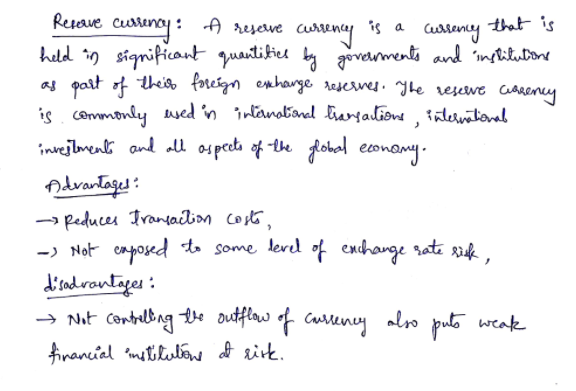Exam 16: The International Financial System
Exam 1: Why Study Financial Markets and Institutions?67 Questions
Exam 2: Overview of the Financial System92 Questions
Exam 3: What Do Interest Rates Mean and What Is Their Role in Valuation?106 Questions
Exam 4: Why Do Interest Rates Change?115 Questions
Exam 5: How Do Risk and Term Structure Affect Interest Rates?107 Questions
Exam 6: Are Financial Markets Efficient?63 Questions
Exam 7: Why Do Financial Institutions Exist?127 Questions
Exam 8: Why Do Financial Crises Occur and39 Questions
Exam 9: Central Banks and the Federal Reserve System101 Questions
Exam 10: Conduct of Monetary Policy: Tools, Goals, Strategy, and Tactics115 Questions
Exam 11: The Money Markets79 Questions
Exam 12: The Bond Market90 Questions
Exam 13: The Stock Market69 Questions
Exam 14: The Mortgage Markets74 Questions
Exam 15: The Foreign Exchange Market87 Questions
Exam 16: The International Financial System93 Questions
Exam 17: Banking and the Management of Financial Institutions104 Questions
Exam 18: Financial Regulation83 Questions
Exam 19: Banking Industry: Structure and Competition135 Questions
Exam 20: The Mutual Fund Industry66 Questions
Exam 21: Insurance Companies and Pension Funds81 Questions
Exam 22: Investment Banks, Security Brokers and Dealers, and Venture Capital Firms102 Questions
Exam 23: Risk Management in Financial Institutions69 Questions
Exam 24: Hedging with Financial Derivatives117 Questions
Exam 25: Financial Crises In Emerging Market Economies24 Questions
Exam 26: Savings Associations and Credit Unions88 Questions
Exam 27: Finance Companies41 Questions
Select questions type
Briefly explain what it means to be a "reserve-currency" country.What are the advantages? Can you think of any disadvantages?
Free
(Essay)
4.8/5  (29)
(29)
Correct Answer:

When the central bank allows the purchase or sale of domestic currency to have an effect on the monetary base,it is called
Free
(Multiple Choice)
4.9/5  (27)
(27)
Correct Answer:
B
What kind of exchange rate system did the Bretton Woods agreement establish?
Free
(Multiple Choice)
4.8/5  (34)
(34)
Correct Answer:
D
Under a fixed exchange rate regime,when the domestic currency is overvalued,the central bank must ________ the domestic currency to keep the exchange rate fixed; as a result,it ________ international reserves.
(Multiple Choice)
4.9/5  (40)
(40)
A balance of payments ________ is associated with a ________ of international reserves.
(Multiple Choice)
4.9/5  (29)
(29)
By the end of 2012,China had accumulated more than $3 trillion of international reserves.
(True/False)
4.8/5  (42)
(42)
A central bank ________ of domestic currency and corresponding ________ of foreign assets in the foreign exchange market leads to an equal ________ in its international reserves and the monetary base.
(Multiple Choice)
4.9/5  (33)
(33)
Explain graphically the speculative attacks that occurred against the British pound in 1992,the Mexican peso in 1994,the Thai baht in 1997,the Brazilian real in 1999,and the Argentine peso in 2002.
(Essay)
4.8/5  (38)
(38)
When it acts as a lender of last resort,the IMF may increase the likelihood that financial institutions take excessive risks and thus increase moral hazard.
(True/False)
4.9/5  (30)
(30)
The euro is unlikely to seriously challenge the dollar as a reserve currency as long as
(Multiple Choice)
4.9/5  (42)
(42)
Describe the pros and cons for controls on capital inflows and outflows.
(Essay)
4.9/5  (37)
(37)
A managed float regime is when countries intervene in foreign exchange markets in an attempt to influence their exchange rates by buying and selling foreign assets.
(True/False)
4.8/5  (28)
(28)
If the current account balance shows a surplus,and capital account receipts exceed capital account payments,then the net change in government international reserves must be ________,indicating a(n)________ in U.S.international reserves.
(Multiple Choice)
4.8/5  (34)
(34)
An unsterilized intervention in which domestic currency is sold to purchase foreign assets leads to a gain in international reserves.
(True/False)
4.8/5  (37)
(37)
Under the Bretton Woods system,when a nonreserve-currency country was running a balance of payments deficit,
(Multiple Choice)
4.8/5  (37)
(37)
(I)Controls on capital outflows may increase capital flight by weakening confidence in the government.
(II)Controls on capital outflows are an inadequate substitute for financial reform to deal with currency crises.
(Multiple Choice)
4.7/5  (34)
(34)
Policymakers may not want to see their country's currency appreciate because
(Multiple Choice)
4.8/5  (40)
(40)
Showing 1 - 20 of 93
Filters
- Essay(0)
- Multiple Choice(0)
- Short Answer(0)
- True False(0)
- Matching(0)